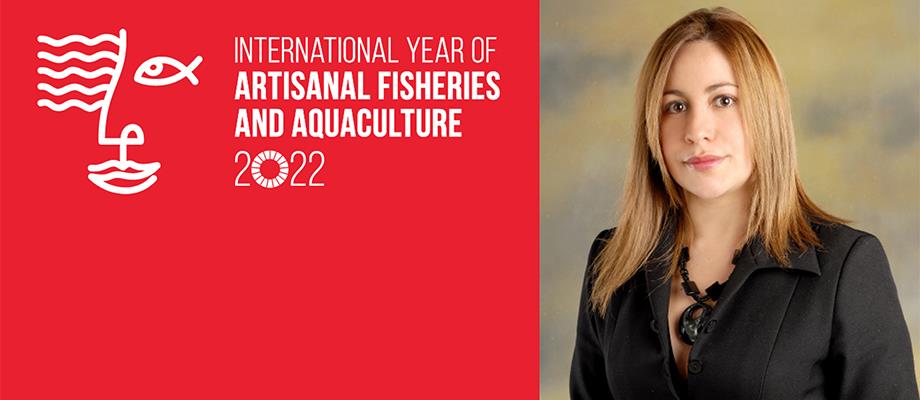IYAFA Interview with Adriana Cadena Cancino, representative of the confederation of the National roundtable of artisanal fishing of Colombia

 |
Pillar 3 of IYAFA’s Global Action Plan is on social sustainability and to raise awareness on the pillar, we sat down with Adriana Cadena Cancino to talk about the importance of securing social inclusion and well-being of small-scale artisanal fishers and fish farmers and to learn from her experience working with the sector in Colombia.
Given that decent working and living conditions are essential to guarantee the livelihoods of fisherfolks, what measures can governments take to guarantee these rights and conditions for artisanal fishers and fish farmers, as well as for fish workers?
Artisanal fishers are subjected to impoverished living conditions due to the general lack of investment in the sector. They are also at risk from environmental crises affecting the different aquatic ecosystems that they depend on. At present, support for fisherfolk is limited to social assistance, which is localized and often disorganized and inadequate, which makes it impossible for the activity to develop.
Governments should recognize fisherfolk as a special subject of constitutional protection, to whom their environmental, cultural, social, labor, political and economic rights are guaranteed, declaring them, in their coastal culture, as natural stewards of aquatic resources and forests, so that under a comprehensive social protection system, they are eligible for social assistance, formalization of employment as well as access to pensions, unemployment insurance in closed seasons and to ensure that they have access to insurance.
The International Year of Artisanal Fisheries and Aquaculture (IYAFA 2022) global action plan advocates the use of participatory processes in policy reviews to identify gaps and opportunities for social protection. In your opinion, how could IYAFA support the expansion of political reviews of this type?
The first thing to emphasize is the relationship between representation and decision. Participatory governance must promote effective interaction between the State and fishing union organizations, as well as other stakeholders, including, academia, non-governmental organizations, international organizations, and cooperatives, in order to reach agreements, to the revise existing policies and promulgate new policies.
Inter-institutional working groups could refer to the IYAFA global action plan when seeking consensus on the projects and programs that should be implemented in the country, considering the interests of all the actors involved in aiming to achieve a comprehensive social protection system for artisanal fish workers.
Why can't social protection be treated as a unilateral policy, but instead should promote inter-ministerial processes and participatory policies in order to create better national policies? Could you please give us examples of successful protection policies consistent with other policies in the fisheries sector?
If we see social protection as a set of policies and programs that addresses various vulnerabilities by protecting and promoting livelihoods, we understand that it is impossible to address the problem of the artisanal fisheries and aquaculture through one single institution.
In Colombia, fisherfolk have an Unmet Basic Needs (UBN) of 90% and illiteracy levels of up to 23%, which means that their needs exceed what is merely productive and are related to various vulnerabilities that would have to be addressed jointly by the ministries of the environment, agriculture, interior, trade, work, health, among others.
Colombia has made great progress in health coverage for vulnerable people who are registered and cared for in the subsidized regime, where the majority of fishers are registered. Finally, there is an ongoing effort of the Social Protection Group on Fishing Dignity that seeks to develop a workplan, with the purpose of eventually developing a social protection system for the sector in the country.
How is Colombia addressing social protection and decent employment in the context of artisanal fishers and fish farmers and fish workers?
In Colombia, vulnerable communities have a broad health coverage system, thanks to the public health service included in the System for the Identification of Potential Beneficiaries of Social Programs (SISBEN - acronym in Spanish). However, social security, being tied to formal employment, leaves fish workers out of the pension system, nor are they covered by the professional risks and unemployment insurance scheme.
The Fisheries Authority carries out incentive promotions through projects related to fish worker's organizations and promotes the formalization of fish workers through the granting of a fishing license and recognition of their work.
For example, in Colombia, currently in Congress, a bill is being discussed with the objective to provide social benefits and subsidies to fishers during closed seasons.
In your opinion, what are the important results we can expect from IYAFA 2022 in the context of social protection?
A fundamental result of IYAFA 2022 would be to increase the understanding of artisanal fishers as essential workers that contribute to food security, and that are deserving of basic social protections. In Colombia we expect to see the beginning of the construction of a special social protection system for Colombian fishing families.
Biography
Doctor in Political, Social and Economic Processes of Latin America; Master in Government and Public Affairs from FLACSO Mexico; Specialist in Financial Management; Professional in International Economic Relations; Executive Director of the National Artisanal Fisheries roudtable Confederation of Colombia; Professor Autonomous University of Colombia; Director of the Network of Strategic Studies for the integration of South America- Intersul; International Speaker; Author of several Books and Articles in Magazines and Newspapers on Topics of Economic, Productive Integration and Artisanal Fishing, among others.
Member of the Intersectoral Commission for Food and Nutritional Security-CISAN; Member of the Fishing Council of the National Apprenticeship Service -SENA; Defender of Artisanal Fishing, Fishing Families and Aquatic Ecosystems; National Advisor of the Process of Characterization, Formalization and Associative Strengthening of Colombian Artisanal Fishermen.
